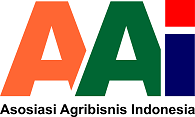Statistical Analysis on Factors that Contribute to Post Harvest Losses of Crops in Rural Area at Nkwanta Districts, Volta Regions, Ghana
Abstract
The study was conducted to assess the factors that contribute to post harvest losses of farm produces in the Nkwanta Districts, Volta Region, Ghana. Data was collected from 250 farmers in the district using a structured questionnaire. The last item on the questionnaire examined the level of agreement attached to various factors influencing post harvest losses in the district on a five point Likert scale. Multivariate factor analysis method was used in the analysis. The results indicated that about 87.2% of the total respondent experience of post harvest losses and there are five salient factors that influence post harvest losses. Difficulties in market accessibility related factors was the most important factor of all. Another important factors accountable for post harvest losses are lack of knowledge and technology related factors, lack of storage facilities and poor packaging, the poor road network, and labour cost. It is therefore recommended that different forms of training and information should be made available for farmers. Also, the establishment of the factories and storage facilities at farming communities should be put in place in order to reduce post harvest losses by way of processing and storage of the excess produces at the local level.
Keywords
Full Text:
PDFReferences
Darwis, V. (2018) "˜Potensi kehilangan hasil panen dan pasca panen jagung di Kabupaten Lampung Selatan', Journal of Food System and Agribusiness, 2(1), pp. 55-67. doi: http://dx.doi.org/10.25181/jofsa.v2i1.1054.
Iswari, K. (2012) "˜Kesiapan teknologi panen dan pascapanen padi dalam menekan kehilangan hasil dan meningkatkan mutu beras', Jurnal Litbang Pertanian, 31(2), pp. 58-67. doi: 10.21082/jp3.v31n2.2012.p%25p.
Karim, A. and Wee, M. (1996) "˜Reducing post harvest losses in vegetables', in Proceedings of Workshop on Vegetable Crops Agribusiness, pp. 2-4.
Kereth, G. A. et al. (2013) "˜Assessment of post-harvest handling practices: Knowledge and losses of fruits in Bagamoyo District of Tanzania', Food Science and Quality Management, 11, pp. 8-16. Available at: https://www.iiste.org/Journals/index.php/FSQM/article/view/3951.
Kobarsih, M. and Siswanto, N. (2015) "˜Penanganan susut panen dan pasca panen padi kaitannya dengan anomali iklim di wilayah Daerah Istimewa Yogyakarta', Planta Tropika Journal of Agro Science, 3(2), pp. 100-106. doi: 10.18196/pt.2015.046.100-106.
Olayemi, F. F. et al. (2012) "˜Assessment of post harvest losses of some selected crops in eight local government areas or Rivers State, Nigeria', Asian Journal of Rural Development, 2(1), pp. 13-23. doi: 10.3923/ajrd.2012.13.23.
Robinson, E. J. and Kolavalli, S. L. (2010) The case of tomato in Ghana: Productivity. Washington, D.C.: International Food Policy Research Institute (IFPRI).
Shiddieqy, M. and Widiani, W. (2012) "˜Kontribusi penanganan pasca panen wortel terhadap pendapatan petani sayuran binaan Sub Terminal Agribisnis (STA) Cigombong Desa Ciherang Kabupaten Cianjur', Journal of Agroscience, 4, pp. 74-84. Available at: https://jurnal.unsur.ac.id/agroscience/article/view/305.
Tefera, T. (2012) "˜Post-harvest losses in African maize in the face of increasing food shortage', Food Sec, 4, pp. 267-277. doi: 10.1007/s12571-012-0182-3.
Verma, A. and Singh, K. (2004) "˜An economic analysis of post-harvest losses in fresh vegetables', Indian Journal of Agricultural Marketing, 18(1), pp. 136-139.
World and Bank (2011) Missing Food: The Case of Post harvest Grain Losses in Sub-Saharan Africa. Washington, D.C.
DOI: https://doi.org/10.37046/jaj.v2i2.7738
Refbacks
- There are currently no refbacks.
Copyright (c) 2021 Author

This work is licensed under a Creative Commons Attribution-NonCommercial-ShareAlike 4.0 International License.
Jambura Agribusiness Journal (P-ISSN: 2685-5860, E-ISSN: 2685-5771) is licensed under a Creative Commons Attribution-NonCommercial-ShareAlike 4.0 International License. Powered by Public Knowledge Project OJS










